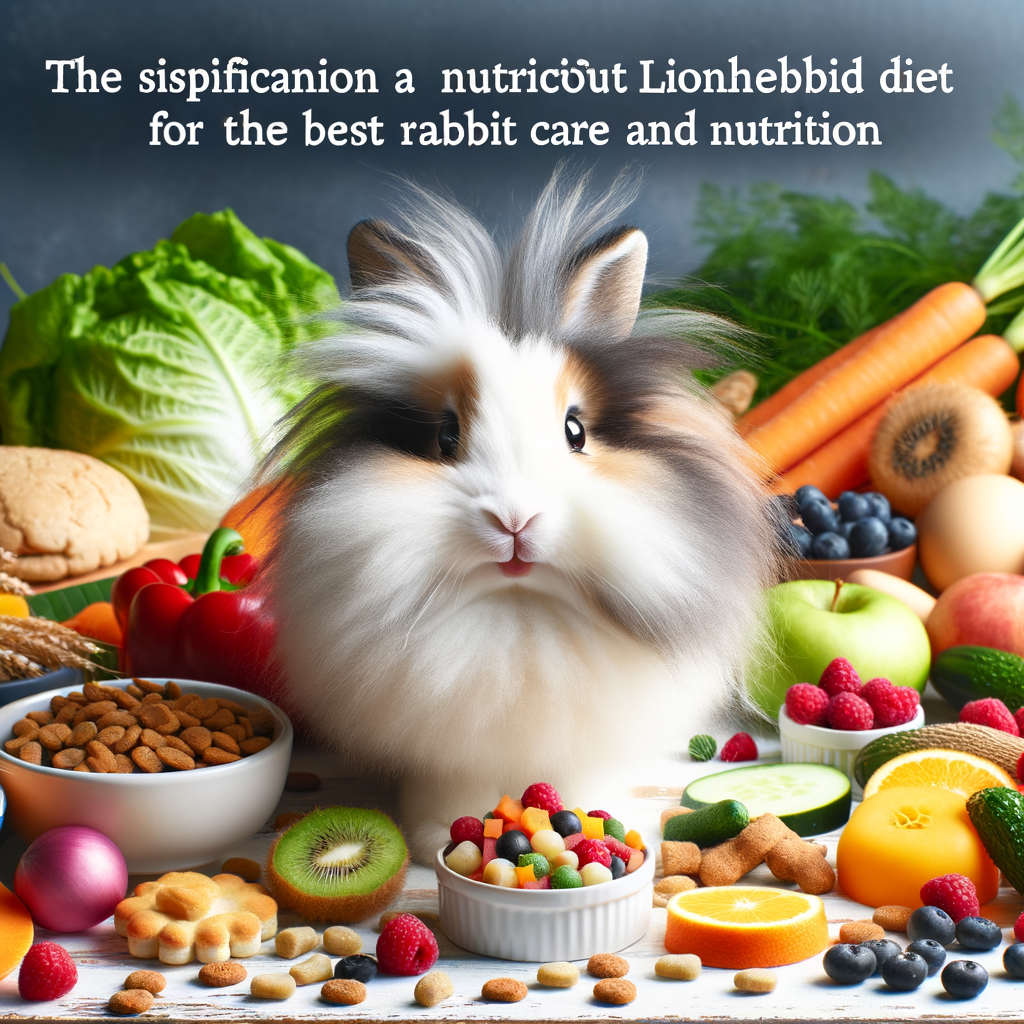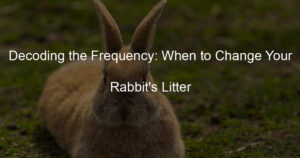
Introduction to Lionhead Rabbit Diet
When it comes to the health and happiness of your Lionhead Rabbit, diet plays a crucial role. In this section, we will explore the importance of a balanced diet for your furry friend and understand their unique nutritional needs.
- Importance of a Balanced Diet for Lionhead Rabbits
- Understanding the Nutritional Needs of a Lionhead Rabbit
A balanced diet is essential for Lionhead Rabbits to lead a healthy and active life. Just like humans, rabbits need a variety of nutrients to stay healthy. A poor diet can lead to various health issues like obesity, dental problems, and digestive disorders. A balanced diet for a Lionhead Rabbit typically consists of hay, fresh vegetables, water, and a small amount of pellets.
Understanding the nutritional needs of a Lionhead Rabbit is key to ensuring their well-being. They require a high fiber diet, which can be provided through hay and fresh vegetables. Fiber aids in digestion and helps maintain healthy teeth. They also need a good amount of water for hydration and a small portion of high-quality pellets for additional nutrients. It’s important to note that treats should be given sparingly and should not make up a significant portion of their diet.
In the following sections, we will delve deeper into safe snacks, healthy food options, and overall care for your Lionhead Rabbit. We will also discuss rabbit nutrition in detail and share some delicious treat ideas that your rabbit will love.
Safe Snacks for Rabbits
Feeding your Lionhead rabbit with the right snacks is crucial for their health and happiness. In this section, we will explore safe vegetables and fruits that can be given to your furry friend.
Vegetables and Fruits
Vegetables and fruits are a great source of vitamins and minerals for your Lionhead rabbit. However, not all of them are safe. Let’s delve into the ones that are beneficial for your rabbit’s health.
- Safe vegetables for Lionhead Rabbits
- Safe fruits for Lionhead Rabbits
Leafy greens like romaine lettuce, bok choy, and spinach are excellent choices for your Lionhead rabbit. Root vegetables such as carrots and radishes can also be given, but in moderation due to their high sugar content. Always remember to wash the vegetables thoroughly before feeding them to your rabbit.
Fruits are like sweet treats for your Lionhead rabbit. Apples (without seeds), bananas, and strawberries can be given in small amounts. However, fruits should not make up the majority of their diet due to the high sugar content. A small slice or a few pieces per day is more than enough.
Remember, while vegetables and fruits are good for your Lionhead rabbit, they should not replace their main diet of hay. Hay is essential for their digestive health and should make up about 70% of their diet. The remaining 30% can be a mix of vegetables, fruits, and pellets.
Always introduce new foods slowly to your Lionhead rabbit and observe for any changes in their behavior or droppings. If you notice any signs of discomfort or illness, stop feeding them the new food immediately and consult a vet.
Grains and Seeds
Feeding your Lionhead Rabbit a balanced diet is essential for their health and well-being. This includes a variety of safe grains and seeds, which can provide essential nutrients and fiber. Let’s explore some of these safe options.
- Safe grains for Lionhead Rabbits
Grains are a great source of carbohydrates, proteins, and fibers. However, not all grains are safe for your Lionhead Rabbit. Here are a few safe options:
- Oats: Oats are a good source of energy and fiber. They can be given in small amounts, either raw or cooked.
- Barley: Barley is another safe grain for rabbits. It’s high in fiber and can help with digestion. However, it should be given in moderation.
- Brown Rice: Brown rice can be a good source of nutrients, but it must be cooked before feeding it to your rabbit.
Remember, grains should only make up a small part of your rabbit’s diet. Always consult with a vet before introducing new foods.
- Safe seeds for Lionhead Rabbits
Seeds can also be a healthy addition to your Lionhead Rabbit’s diet, providing essential fats and proteins. Here are some safe seeds for your furry friend:
- Flaxseeds: These seeds are a great source of Omega-3 fatty acids, which are beneficial for your rabbit’s coat and skin.
- Sunflower Seeds: Sunflower seeds can be given in moderation. They are high in fat, so they should be used as a treat rather than a regular part of the diet.
- Pumpkin Seeds: Pumpkin seeds are safe for rabbits and can be given as a treat. Make sure they are raw and unsalted.
As with grains, seeds should be introduced slowly and in small amounts to avoid digestive issues. Always consult with a vet for personalized advice.
Healthy Rabbit Food
Feeding your rabbit a healthy diet is crucial for their overall well-being. One way to ensure they are getting the right nutrients is by making homemade treats. These treats can be a fun and nutritious addition to your rabbit’s regular diet.
Homemade Rabbit Treats
Homemade treats are not only cost-effective, but they also allow you to control the ingredients that go into your rabbit’s diet. Here are two simple and healthy recipes you can try:
- Recipe 1: Carrot and Hay Cookies
- Recipe 2: Apple and Oat Treats
Carrots are a favorite treat for many rabbits, and hay is an essential part of their diet. Combining these two can make a delicious and nutritious treat.
| Ingredients | Instructions |
|---|---|
| 1 cup of hay, 1/2 cup of carrots, 1/4 cup of rabbit pellets, 1/4 cup of water | Blend all the ingredients in a food processor until they form a dough. Shape the dough into small cookies and bake at 325°F for about 30 minutes. |
Apples and oats are also great ingredients for homemade rabbit treats. Remember to remove the apple seeds as they can be harmful to rabbits.
| Ingredients | Instructions |
|---|---|
| 1 apple, 1 cup of oats, 1/4 cup of rabbit pellets, 1/4 cup of water | Blend the apple, oats, and rabbit pellets in a food processor. Add water as needed to form a dough. Shape into small treats and bake at 325°F for about 30 minutes. |
Remember, these treats should only make up a small portion of your rabbit’s diet. The majority of their diet should still be made up of hay, fresh vegetables, and a small amount of rabbit pellets.
Store-Bought Rabbit Treats
While homemade treats are a great option for your Lionhead rabbit, there are also many high-quality, store-bought treats available. These can be a convenient choice for busy rabbit owners. Let’s take a look at some of the best options and what to consider when buying them.
- Best store-bought treats for Lionhead Rabbits
- Timothy Hay-Based Treats: These are a great choice as they are high in fiber and low in sugar. They also help to promote dental health.
- Vegetable-Based Treats: These treats often contain a mix of vegetables that are safe for rabbits, providing them with a variety of nutrients.
- Fruit-Based Treats: While these should be given sparingly due to their higher sugar content, they can be a tasty treat for your rabbit.
- What to look for when buying store-bought treats
- Natural Ingredients: Always check the ingredients list. The best treats are made from natural, rabbit-safe ingredients with no added sugars or artificial preservatives.
- Nutritional Value: Look for treats that offer nutritional value, such as those high in fiber and low in fat.
- Size of the Treat: The treat should be appropriately sized for your rabbit. Too large and it could pose a choking hazard, too small and your rabbit may not be interested.
When it comes to store-bought treats, it’s important to choose ones that are specifically designed for rabbits. Some of the best options include:
When buying store-bought treats for your Lionhead rabbit, there are several things you should look for:
In conclusion, while store-bought treats can be a convenient option, it’s important to choose wisely. Always opt for treats that are made specifically for rabbits, with natural ingredients and high nutritional value. Remember, treats should complement your rabbit’s diet, not replace their regular meals.
Lionhead Rabbit Care
When it comes to caring for your Lionhead Rabbit, one of the most important aspects is their diet. This includes not only their main meals but also the snacks they consume. Let’s delve into the world of nutritious rabbit snacks.
Nutritious Rabbit Snacks
Just like us, rabbits also enjoy a good snack. However, it’s crucial that these snacks are not only tasty but also nutritious. Let’s explore this further.
- Importance of nutritious snacks in a Lionhead Rabbit’s diet
- Examples of nutritious snacks
Snacks play a vital role in a Lionhead Rabbit’s diet. They not only provide variety but also essential nutrients that may not be present in their main meals. Nutritious snacks can help maintain a healthy weight, improve digestion, and boost overall health. They also play a significant role in keeping your rabbit’s teeth in good condition, as chewing helps to wear down their constantly growing teeth.
There are numerous snacks that are not only delicious but also beneficial for your Lionhead Rabbit. Here are a few examples:
| Snack | Benefits |
|---|---|
| Carrots | Rich in Vitamin A, which is good for their eyesight. |
| Apples (without seeds) | High in fiber, which aids digestion. |
| Broccoli | Packed with vitamins and minerals to boost overall health. |
| Hay cubes | Great for dental health as they help wear down teeth. |
Remember, while these snacks are beneficial, they should be given in moderation and should not replace a balanced diet.
In conclusion, nutritious snacks are an integral part of a Lionhead Rabbit’s diet. They provide essential nutrients, help maintain dental health, and add variety to their meals. So, the next time you are considering a snack for your furry friend, remember to choose something that is not only tasty but also nutritious.
Feeding Schedule and Portions
Understanding the feeding schedule and portion sizes for your Lionhead Rabbit is crucial for their health and wellbeing. Let’s delve into the recommended feeding schedule and appropriate portion sizes for these adorable creatures.
-
Recommended Feeding Schedule for Lionhead Rabbits
Lionhead Rabbits, like all rabbits, are herbivores. This means they eat plants. It’s recommended to feed your Lionhead Rabbit twice a day, once in the morning and once in the evening. This mimics their natural feeding habits in the wild.
Here’s a simple feeding schedule you can follow:
Time Food Morning Fresh vegetables and a handful of pellets Evening Fresh hay and a few more pellets Remember, fresh water should be available to your rabbit at all times.
-
Appropriate Portion Sizes for Lionhead Rabbits
Portion sizes are just as important as the feeding schedule. Overfeeding can lead to obesity and other health problems. Here are some guidelines for portion sizes:
- Hay: Your rabbit’s diet should consist of about 70% hay. This should be available to them at all times.
- Pellets: Give your rabbit about 1/4 cup of pellets for every 5 pounds of body weight each day.
- Vegetables: Provide 1 cup of fresh vegetables for every 2 pounds of body weight daily.
Remember, these are just guidelines. Every rabbit is unique and may have different dietary needs. Always consult with a vet if you’re unsure about portion sizes.
Feeding your Lionhead Rabbit properly is a big part of their care. By following a regular feeding schedule and providing the right portion sizes, you can help ensure your rabbit stays healthy and happy.
Rabbit Nutrition
Understanding the nutritional needs of your rabbit is crucial to their health and wellbeing. Let’s delve into the fascinating world of rabbit nutrition, starting with their unique digestive system.
Understanding Rabbit Digestive System
Rabbits have a unique and complex digestive system, which is different from ours. Understanding how it works can help us make better food choices for our furry friends.
- How the rabbit digestive system works
- Why certain foods are harmful to rabbits
Rabbits are herbivores, meaning they eat plants. Their digestive system is designed to break down fibrous plant material. The process starts in the mouth, where food is chewed and mixed with saliva. It then travels down the esophagus into the stomach, where it’s broken down further by stomach acids.
Next, the food moves into the small intestine, where nutrients are absorbed. The remaining undigested food then travels to the large intestine and finally to the cecum. The cecum is a special part of the rabbit’s digestive system where bacteria break down the undigested food into nutrients. Some of these nutrients are then reabsorbed when the rabbit eats its cecotropes, a special type of droppings.
Not all foods are safe for rabbits. Some can cause serious health problems. For example, foods high in sugar or starch can disrupt the balance of bacteria in the cecum, leading to digestive problems. Similarly, foods low in fiber can cause constipation.
Some foods are toxic to rabbits. These include chocolate, avocado, and certain types of plants like rhubarb and foxglove. Always check if a food is safe before giving it to your rabbit.
In conclusion, understanding the rabbit digestive system can help us make better food choices for our pets. By feeding them a diet high in fiber and low in sugar and starch, we can help keep their digestive system healthy and functioning properly.
Nutritional Requirements of Rabbits
Just like humans, rabbits also have specific nutritional needs that must be met for them to live healthy and happy lives. Understanding these requirements is crucial for every rabbit owner. Let’s delve into the essential nutrients for rabbits and how to ensure your rabbit is getting a balanced diet.
- Essential nutrients for rabbits
- Fiber: This is the most important part of a rabbit’s diet. It aids in digestion and helps prevent obesity and dental problems. Hay is an excellent source of fiber for rabbits.
- Protein: Rabbits need protein for growth and repair. Good sources include leafy greens and rabbit pellets.
- Vitamins and Minerals: These are essential for a rabbit’s overall health. They can be found in a variety of fruits, vegetables, and specially formulated rabbit foods.
- Water: Rabbits need constant access to fresh, clean water to stay hydrated and healthy.
- How to ensure your rabbit is getting a balanced diet
- Hay: This should make up about 70% of your rabbit’s diet. It’s high in fiber and helps keep their teeth in good shape.
- Vegetables: Fresh veggies should make up about 20% of the diet. Choose leafy greens like lettuce and spinach.
- Pellets: These should only make up about 5% of the diet. Choose high-quality pellets that are rich in fiber.
- Fruits: These should be given as treats, making up about 5% of the diet. Avoid giving too much as they are high in sugar.
Rabbits require a variety of nutrients for optimal health. These include:
Providing a balanced diet for your rabbit involves more than just giving them the right foods. It’s also about the right proportions. Here’s a simple guide:
Remember, every rabbit is unique and may have different dietary needs. Always consult with a vet for personalized advice.
Delicious Rabbit Treats
Feeding your rabbit doesn’t have to be a boring task. You can spice up their diet with some delicious homemade treats. Not only are these treats tasty, but they also provide essential nutrients that your rabbit needs. Let’s explore some easy-to-make recipes.
Homemade Treats
Homemade treats are a great way to ensure that your rabbit is getting a healthy and balanced diet. Here are two simple recipes that your rabbit will love:
- Recipe 1: Banana and Hay Cookies
- Mash one ripe banana.
- Mix the mashed banana with a handful of hay.
- Shape the mixture into small cookies and place them on a baking sheet.
- Bake at 350 degrees for 15 minutes or until golden brown.
- Let them cool before serving to your rabbit.
- Recipe 2: Pumpkin and Oat Treats
- Mix one cup of oats with a half cup of pureed pumpkin.
- Shape the mixture into small balls and place them on a baking sheet.
- Bake at 350 degrees for 15 minutes or until firm.
- Let them cool before serving to your rabbit.
This is a simple and nutritious treat for your rabbit. Bananas are a good source of potassium and fiber, while hay is essential for a rabbit’s digestive health. Here’s how to make them:
Pumpkin is a good source of vitamins A and C, while oats provide essential fiber. Here’s how to make these treats:
Remember, treats should only make up a small part of your rabbit’s diet. The majority of their diet should consist of hay, fresh vegetables, and a small amount of pellets. Always consult with your vet before introducing new foods into your rabbit’s diet.
Store-Bought Treats
While homemade treats are a great option for your Lionhead Rabbit, there are also a variety of delicious store-bought treats available. These treats can be a convenient option for busy pet owners. Let’s explore some of the best options and what you should look for when buying these treats.
- Best Delicious Store-Bought Treats for Lionhead Rabbits
There are numerous store-bought treats that your Lionhead Rabbit will love. Here are a few of the best:
| Name | Ingredients | Benefits |
|---|---|---|
| Nibble Rings | Compressed hay and natural grains | Helps with dental health and provides essential fiber |
| Bunny Bites | Carrot, peas, and alfalfa | Provides vitamins and minerals, and satisfies the chewing instinct |
| Rabbit Crunchies | Whole grain and honey | Offers a sweet treat and promotes digestive health |
- What to Look for When Buying Delicious Store-Bought Treats
When purchasing store-bought treats for your Lionhead Rabbit, there are a few key things to keep in mind:
- Natural Ingredients: Look for treats made with natural ingredients. Avoid treats with artificial colors, flavors, or preservatives.
- Nutritional Value: Treats should not only be tasty but also provide nutritional benefits. Look for treats that offer vitamins, minerals, and fiber.
- Size and Hardness: The treat should be an appropriate size for your rabbit and not too hard to chew. This can help prevent choking hazards and dental problems.
Remember, while treats can be a fun addition to your rabbit’s diet, they should not replace a balanced diet of hay, fresh vegetables, and pellets. Always monitor your rabbit while they’re enjoying a treat to ensure they’re eating it safely.




